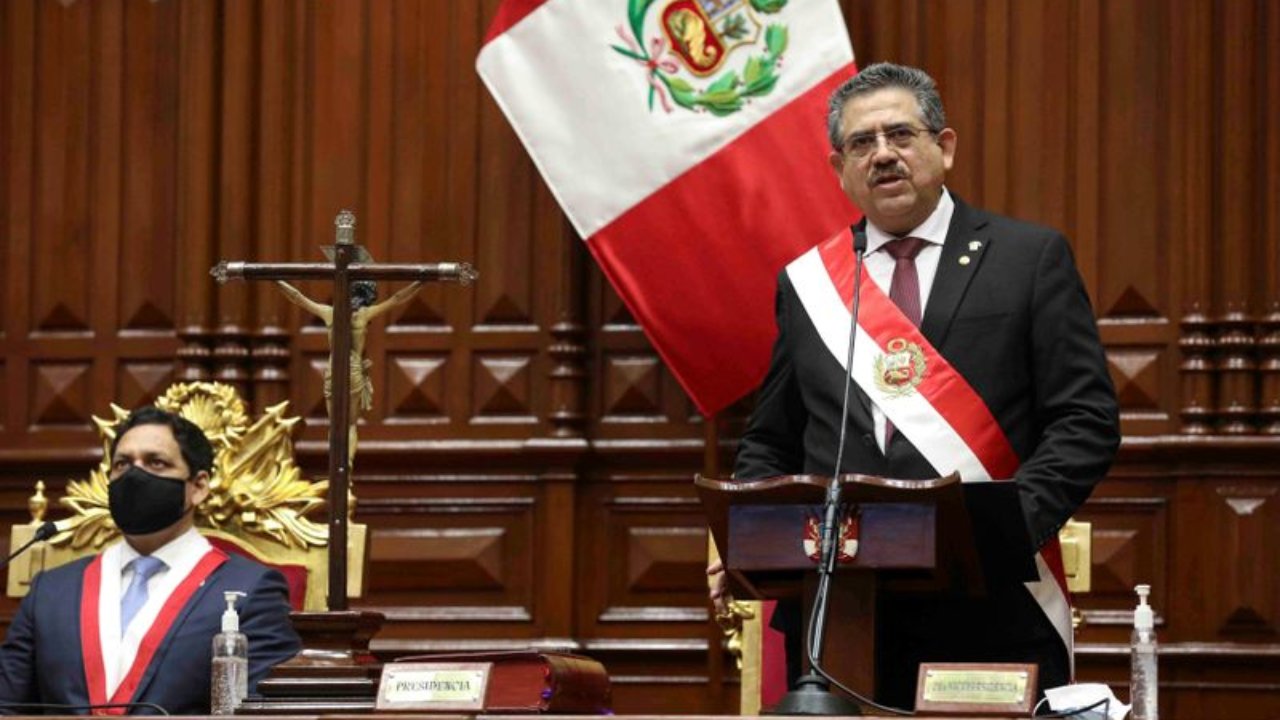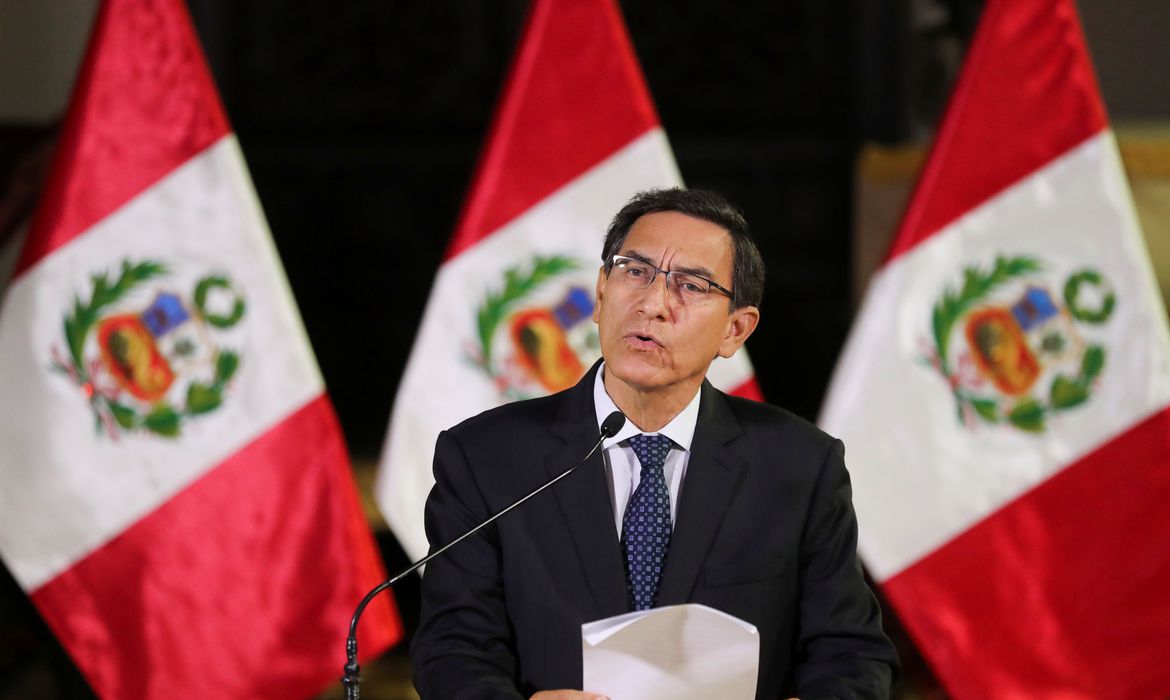RIO DE JANEIRO, BRAZIL – The rejection of the ways in which the Peruvian Congress dismissed President Martín Vizcarra for an alleged case of bribery that dates back to his time as regional governor in 2014 is not only felt in the streets of the country.
While several platforms, unions, and organizations are preparing for a new mobilization called for this Thursday, international organizations and neighboring countries have warned of the risks that this transition poses for the architecture of the rule of law. The Organization of American States (OAS) and the governments of the region have not recognized the authority of the interim leader, Manuel Merino, while neighboring countries have adopted caution in the expectation that the electoral calendar will be respected.
Faced with the political crisis in the country, the OAS has highlighted the role of constitutional judges who had pending, since September, to set parameters to define the legislative interpretation of the figure of “presidential vacancy” due to “permanent moral incapacity”, the reason for which Vizcarra was deposed.

“In this new case, the OAS General Secretariat reiterates that it is the responsibility of the Constitutional Court of Peru to rule on the legality and legitimacy of the institutional decisions adopted, as well as on the differences that may exist in the interpretation of the Constitution,” it said in a statement.
The inter-American body stated that “in this complex situation, political actors are responsible for ensuring the operation of democracy for the good of the country, as well as for guaranteeing the holding of national elections called for April 11th.”
Just as the OAS statement does not recognize Merino as the new president, the governments of the region are also cautious in their pronouncements on the crisis in Peru.
The Brazilian Ministry of Foreign Affairs said it is following recent events in Peru with attention. “The Brazilian Government welcomes the announcement of the new Government, by which the current electoral schedule was confirmed, with elections scheduled for April 11th, 2021, and expresses confidence that the Peruvian institutions will be able to meet the desires and democratic culture of its people,” it said in a note.
Argentina also stated in a note that it trusts “the commitment to conduct a democratic transition and to respect the ongoing electoral process.” Colombia was more incisive in its statement. It did not mention the interim president and highlighted the progress in relations with the government of Martín Vizcarra, emphasizing his leadership in the Lima Group – which includes Foreign Ministers of the Americas to discuss solutions to the crisis in Venezuela.
Paraguay wished Manuel Merino “good luck”. While Chile wishes the new president “a good performance in his administration.”
As a result of police violence against protesters that has characterized the beginning of the transitional government, the United Nations human rights representative in South America, Jan Jarab, asked the Peruvian authorities to “put an end to this type of procedure.” “Our Office has been able to verify cases of arrests made by plainclothes police officers without identifying themselves as such,” he added.
Human Rights Watch (HRW) has also considered that “the way in which the Peruvian Congress removed President Martín Vizcarra from office on November 9th, 2020 and the immediate consequences that this could have for the independence of the Constitutional Court, represent a serious threat to the rule of law in the country.”
In his first interview after taking office as interim president, Merino declared on a Colombian radio station that “the protests and anxiety” are due to “tendentious communication practices.” When the journalists asked him about challenges to Congress decisions, he cut off the call.
After his cabinet was sworn-in, the politician said that there will be no traumatic change and reiterated his “democratic commitment.” “We Peruvians want to regain peace and recover thousands of jobs,” he said. The new Cabinet is made up of professionals who have served as lobbyists for private companies, some belong to the leftist APRA party, while others represent the most conservative sectors of the South American country.

Education sector outrage
The main study center in the country, the National University of San Marcos, repudiated “any act that violates governance and constitutional order” and recommended “the powers of the State to reinforce the evaluation of educational quality already advanced.”
This position is due to the fact that over the past five years the National Superintendency of Higher Education (SUNEDU) closed 47 universities for failing to comply with the required minimum standards; several of the leaders of the political groups that promoted Vizcarra’s removal are either owners, officials or professors in these institutions and have used Parliament to remove the superintendency’s powers.
The owner of one of the private universities that lost its license, Telesup, is the leader of Podemos Peru, José Luna Gálvez, who has been in preventive custody for four days and under investigation for several crimes: money laundering in the Odebrecht case and for having financed the campaigns of public officials who elected the president of the National Body for Electoral Processes, in order to facilitate the registration of their political group.
On Wednesday, one of Luna Gálvez’s sons, Luis Luna Morales, sent a notarized letter to the director of the higher education superintendency threatening him with sanctions when he is dismissed, now that his father’s party is part of the coalition in power in the Executive.
After the scandal caused by the disclosure of the letter, one of Telesup’s attorneys said that “it was a mistake, given the moment”, and that they will retract the letter. The law firm of Antero Flores Aráoz, the new president of the interim government’s Council of Ministers, has been in charge of Telesup’s defense for several years. The university has even granted him an honorary doctorate.
After many years of poor quality in public and private universities, Peruvians consider it an achievement to have professional supervision of the education on offer, therefore popular demonstrations alert to the Superintendency’s vulnerability with the new interim government.
The Faculty of Arts of the University of San Marcos is more explicit in its statement on the political crisis: “No to the coup! Defense of university law and Sunedu!” reads the headline. Furthermore, twelve Catholic universities described the removal of the president as “questionable and hasty”, “which exacerbates the instability and uncertainty” the country is experiencing.
One of the country’s most important labor unions, the National Textile Workers Federation of Peru, has also rejected the transitional government. “Merino does not represent us, but Vizcarra and the neoliberal institutions do not either,” they highlight in a call to citizen mobilization.
In the protests on Wednesday night, most of the posters and flags repeated the message “Merino is not my president”. The protest was called from 5 PM on Thursday in virtually all regions of the country.
Source: El País

